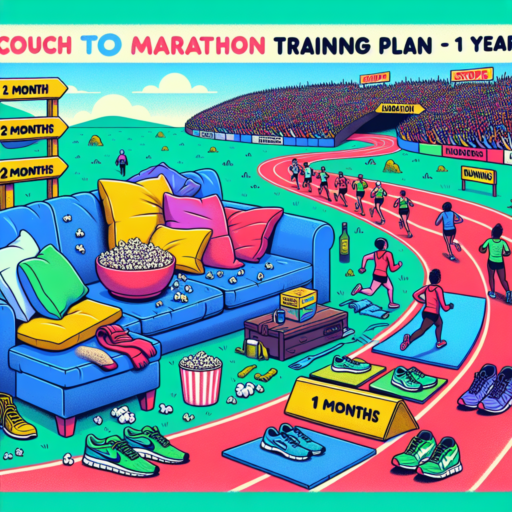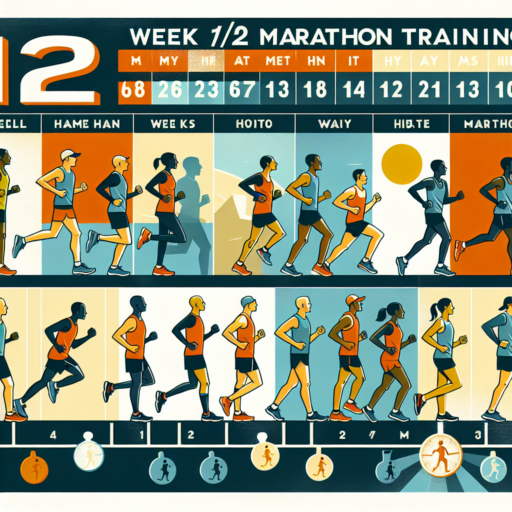Unlocking the Secrets to a Sub 4 Hour Marathon: Your Ultimate Guide
Achieving a sub 4 hour marathon is a coveted milestone for many runners, symbolizing a significant achievement in endurance, speed, and discipline. This ultimate guide is designed to unlock the secrets to not only reach, but surpass this goal. Whether you’re a seasoned marathoner looking to shave off minutes or a dedicated runner poised to make a sub 4 hour marathon your next big achievement, understanding the key strategies is essential.
Essential Training Tips
Training for a sub 4 hour marathon requires a blend of long runs, speed work, and recovery. Incorporating interval training and tempo runs into your regimen can significantly enhance your speed and stamina. Equally crucial is the long, slow distance run, which trains your body to efficiently burn fat as fuel, sparing glycogen reserves for the later stages of the marathon. Prioritizing recovery through proper nutrition, hydration, and rest ensures that your body can heal and grow stronger.
Nutrition and Hydration Strategies
Nutrition and hydration play a pivotal role in achieving a sub 4 hour marathon. A balanced diet rich in carbohydrates, proteins, and healthy fats provides the energy needed for intense training, while proper hydration optimizes performance and recovery. Implementing a carbohydrate-loading strategy in the days leading up to the marathon can also help to maximize glycogen stores, ensuring that you have the energy reserves needed to maintain pace throughout the race.
Mental Preparation
Mental resilience is just as important as physical preparedness when aiming for a sub 4 hour marathon. Developing a strong mental game involves setting realistic goals, visualizing success, and practicing positive self-talk. Additionally, devising a race-day strategy that includes pace management and knowing when to conserve or expend energy can make a significant difference in your performance. Mental toughness will help you push through the inevitable challenges and discomforts of marathon running.
Creating Your Marathon Training Schedule for a Sub 4 Hour Finish
Embarking on the journey to complete a marathon in under four hours is an ambitious goal that requires a well-thought-out training plan. For runners looking to achieve this milestone, a sub 4 hour marathon training schedule is pivotal. Constructing a personalized training calendar that incorporates a balance of distance, pace, and recovery is key to crossing the finish line with your target time in sight.
Interval Training is one of the cornerstones of a successful marathon training plan. Incorporating shorter runs at a faster pace than your target marathon pace can significantly improve your cardiovascular fitness and running efficiency. It’s recommended to include one to two days of interval training in your weekly schedule. This not only helps in building speed but also prepares your body to maintain a consistent pace throughout the 26.2 miles.
Another critical element is Long Runs. Gradually increasing the length of your longest weekly run is essential to ensure your body can handle the demands of the full marathon distance. Ideally, your schedule should lead you to complete at least one 20-mile run before the tapering period begins. This not only builds endurance but also boosts your confidence knowing you can cover most of the marathon distance.
Mixing in Rest and Recovery days is equally crucial. Training for a sub 4 hour marathon is taxing on both the mind and body. Including rest days in your training calendar helps prevent overtraining and injuries, allowing your body to recover and adapt to the increased demands of marathon training. Remember, recovery is where the real training gains are made.
Essential Workouts for Achieving a Marathon Time Under 4 Hours
Breaking the 4-hour mark in a marathon is a significant milestone for many runners, showcasing not only endurance but also dedicated preparation. To achieve this, incorporating specific workouts into your training routine is crucial. These workouts are designed to improve both your speed and stamina, enabling you to maintain a faster pace over the marathon distance.
Interval Training
Interval training is fundamental for runners aiming to complete a marathon in less than 4 hours. This type of workout involves alternating between periods of high-speed running and recovery. For instance, running 800 meters at a fast pace, followed by a 400-meter jog or walk, repeated several times, can significantly boost your aerobic capacity and speed. The key is to ensure the fast segments are run at a pace quicker than your target marathon pace, pushing the body to adapt to higher intensities.
Long Distance Runs at Goal Pace
Long distance runs are the cornerstone of any marathon training plan, but incorporating segments at your goal marathon pace can dramatically improve your ability to maintain pace on race day. Try including a mid-run section, where you run at your desired marathon pace for 5 to 10 miles during your longer runs. This not only enhances your stamina but also builds mental toughness and pace awareness, crucial components for a sub-4-hour marathon.
Week-by-Week Breakdown: The Path to a Sub 4 Hour Marathon
Embarking on the journey to achieve a sub 4-hour marathon requires a detailed, disciplined training regimen. This week-by-week breakdown is designed to progressively build your endurance, speed, and confidence, ultimately enabling you to cross the finish line with a time you can be proud of. Let’s explore the highlights of this transformative process.
Building a Strong Foundation
In the initial weeks, your focus should be on building a strong aerobic base. This period is not about speed; it’s about consistency and gradually increasing your mileage. Include long, slow runs to teach your body to burn fat more efficiently and improve your endurance without overexerting yourself. Incorporating strength training twice a week during this phase is also crucial for enhancing your muscular endurance and preventing injuries.
Integrating Speed and Tempo Work
As your training progresses, introducing speedwork and tempo runs becomes essential. These workouts are key to improving your lactate threshold and running economy, both vital for a sub 4-hour finish. Sessions such as Yasso 800s and tempo runs at marathon pace should be incorporated judiciously to avoid burnout. Remember, these intense workouts should be followed by adequate recovery or easy days to allow your body to adapt and recover.
Tapering and Race Strategy
In the final weeks leading up to the marathon, tapering is crucial. Gradually reducing your mileage allows your body to recover from the cumulative fatigue of training while maintaining your fitness level. This period is also the time to finalize your race day strategy, focusing on pacing, hydration, and nutrition. Practicing your race day nutrition during longer runs can help you avoid gastrointestinal issues on the big day. Remember, running a successful marathon is not just about the physical training but also strategizing and mental preparation.
No se han encontrado productos.
Nutrition and Hydration Strategies for Sub 4 Hour Marathon Success
Achieving a sub 4 hour marathon is a benchmark for many amateur runners, marking a significant milestone in one’s running career. Crucial to crossing this threshold is not only rigorous training but also a meticulous approach to nutrition and hydration. Understanding how to fuel your body before, during, and after your runs will optimize your performance and recovery, getting you closer to your sub 4 hour goal.
Pre-Marathon Nutrition
Preparing your body for the marathon starts weeks before the race day. Incorporating a diet rich in complex carbohydrates, lean proteins, and healthy fats ensures your energy stores are filled. During the week leading up to the marathon, focus particularly on increasing your carbohydrate intake to maximize glycogen stores—the primary energy source for long-distance running.
Race Day Hydration
Hydration is another cornerstone of marathon success, requiring a strategy that starts well before race day. Aiming for a consistent intake of fluids in the days leading up to the marathon ensures you’re starting well-hydrated. On the day, your focus should pivot to balancing your electrolytes—sodium, potassium, magnesium—while maintaining hydration. Drinking small amounts of a sports drink every 15 to 20 minutes is a recommended strategy to replace lost electrolytes and sustain energy levels without risking overhydration.
Adopting these nutrition and hydration strategies is vital for athletes aiming to complete a marathon in under four hours. A tailored approach to fueling can significantly impact your performance, illustrating that success in marathon running is not just about how many miles you log, but also about how well you prepare your body’s energy and hydration needs.
The Role of Recovery in Crushing Your Sub 4 Hour Marathon Goal
Recovery is often the unsung hero of marathon training, particularly when aiming for a sub 4-hour finish. It’s the secret ingredient that allows athletes to continuously train hard without succumbing to injury or burnout. The emphatic goal of breaking the sub 4-hour marathon barrier necessitates not just rigorous training but a dedicated commitment to recovery strategies. Understanding how and why recovery impacts performance is pivotal for any runner on this journey.
Recovery methods, when implemented correctly, can significantly reduce muscle fatigue, mitigate the risk of injury, and enhance overall performance. Techniques such as active recovery, proper nutrition, adequate sleep, and hydration play crucial roles in the body’s ability to repair itself. For marathon runners, this isn’t about merely taking a day off; it’s about integrating these practices as part of a holistic training regimen. Active recovery days, for instance, might include low-intensity activities that promote blood flow without putting undue strain on the muscles, aiding in the flushing out of toxins and speeding up the healing process.
Moreover, the strategic use of recovery days can have significant psychological benefits, helping to prevent mental fatigue and keep motivation high. The journey to a sub 4-hour marathon is as much a mental challenge as it is physical. Incorporating rest and recovery techniques not only prepares the body for the high demands of marathon training but also ensures that the mind remains sharp and focused. The emphasis on recovery is a testament to the understanding that peak performance is achieved not only through the accumulation of miles but through the careful balance of hard work and rest.
Common Pitfalls to Avoid in Your Sub 4 Hour Marathon Training
Training for a sub 4 hour marathon is an ambitious goal that requires discipline, dedication, and a well-structured plan. However, many runners fall into the same traps that can hinder their progress and potentially lead to injury or burnout. By understanding these common pitfalls, you can adjust your training approach to ensure you’re on the right track to achieving your marathon goals.
Ignoring Rest and Recovery
One of the most common mistakes runners make in their training is not allowing adequate time for rest and recovery. It’s easy to think that more miles equals better performance, but the body needs time to repair and strengthen. Overtraining can lead to fatigue, injury, and overall burnout. Incorporate rest days into your schedule and listen to your body, giving it the necessary time to recover.
Overlooking Nutrition and Hydration
Another crucial aspect that is often neglected is nutrition and hydration. Proper fueling is essential for endurance training, especially when targeting a sub 4 hour marathon. Failing to consume the right balance of carbohydrates, proteins, and fats can impair your performance and recovery. In addition, inadequate hydration can lead to dehydration, affecting your stamina and health. Ensure to have a balanced diet and drink plenty of fluids before, during, and after your training sessions.
Skipping Speed and Interval Workouts
Lastly, many runners aiming for a sub 4 hour marathon make the mistake of focusing solely on distance, neglecting the importance of speed and interval training. These workouts are vital for improving your running economy and pace. Integrating tempo runs, interval training, and hill sprints into your regimen will not only boost your speed but also enhance your overall marathon performance.
Tuning Your Mental Game for a Sub 4 Hour Marathon Victory
Aiming for a sub 4 hour marathon is a goal that combines the essence of physical endurance with mental tenacity. It’s not just about having the legs and lungs to power through 26.2 miles; it’s equally about harnessing the strength of your mind. Mental preparation can often be the unsung hero of marathon training. In this essence, tuning your mental game is crucial for achieving that sub 4 hour goal.
Visualization techniques are a powerful tool in your mental preparation arsenal. Imagining yourself crossing the finish line with the clock showing a time under 4 hours can be incredibly motivating. It’s about creating a mental image of success, which can guide your training, boost your confidence, and alleviate race day anxieties. Incorporating visualization into your daily training routine can transform your outlook and approach towards the marathon, making that sub 4-hour finish feel within reach.
Another key aspect is developing a positive mental attitude. Running a marathon is as much about battling doubts and fears as it is about covering the distance. Counter negative thoughts with positive affirmations. Remind yourself of your training, your strength, and your capability to achieve your goals. This mindset can be the difference between pushing through the 20-mile mark wall or succumbing to it. Remember, your mind can take you far beyond where your feet think they can go.
Real Stories: Lessons from Runners Who Achieved Sub 4 Hour Marathons
Experiencing the awe-inspiring moment of crossing a marathon finish line under four hours is a dream many runners chase. This significant achievement isn’t just about physical endurance; it’s about the mental strategies, precise training, and personal sacrifices that go into pre-race preparation. In diving into the real stories of runners who’ve achieved sub 4 hour marathons, certain patterns of dedication and strategic planning emerge, offering invaluable lessons for aspiring runners.
One common thread among these successful athletes is their commitment to structured training plans. Tailoring their workouts to gradually increase distance while mixing in speed work, many of these runners emphasize the role of consistency and recovery. Listening to their bodies to avoid overtraining and injuries was a key strategy that enabled them to steadily improve their performance. These stories often highlight the importance of rest days, proper nutrition, and cross-training activities to maintain a balanced approach to marathon preparation.
Another vital lesson is the significance of mental toughness and visualization techniques. Many accomplished runners credited mental preparation and setting realistic goals as critical factors in their success. They speak about breaking the marathon into smaller, more manageable segments, focusing on running each segment at a time, and visualizing crossing the finish line to maintain motivation. Learning to control anxiety and pain through mental strategies was another recurring theme, demonstrating the psychological endurance required to tackle a sub 4 hour marathon successfully.
Must-Have Gear and Gadgets for Your Sub 4 Hour Marathon Training Plan
Training for a marathon with a goal of finishing in under four hours is an ambitious target that requires meticulous preparation, dedication, and the right set of tools. Technological advancements and innovative sports equipment have made it easier for runners to optimize their training, monitor progress, and stay motivated throughout their training journey. Among the plethora of options, certain gear and gadgets stand out as essential components for any athlete aiming to conquer the marathon within this challenging timeframe.
High-Performance Running Shoes
The foundation of any successful marathon training plan lies in selecting the right pair of running shoes. High-performance shoes designed for long-distance running can significantly reduce the risk of injury and improve your overall efficiency. Look for shoes with adequate cushioning, support, and a responsive feel to ensure comfort and speed during your long runs and speed work sessions. Brands like Nike and Adidas offer models specifically engineered for marathoners aiming to achieve swift times.
Advanced Wearable Technology
In an era where data plays a crucial role in sports training, incorporating advanced wearable technology into your regimen is non-negotiable. GPS watches and heart rate monitors provide real-time feedback on pace, distance, elevation, and heart rate, allowing you to fine-tune your training intensity and ensure you’re working within the correct zones to build endurance and speed efficiently. Notable examples include the Garmin Forerunner series and Apple Watch, both of which offer extensive metrics tailored for runners.




